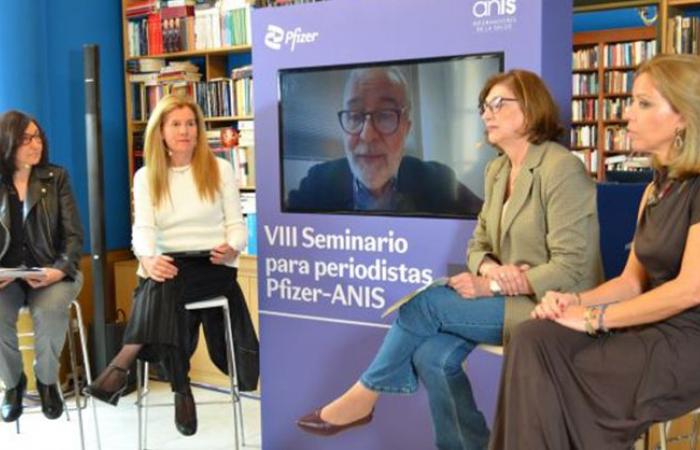
Within the framework of World Immunization Week, the VIII Seminar “Challenges of vaccination in times of misinformation”organized by Pfizer and the National Association of Health Informators (ANIS), has addressed these challenges. In it, different experts have analyzed the current panorama of vaccination in adults, with special attention to this population group, and have presented various strategies to counteract the misinformation that affects public health.
A new patient profile among the adult population
Society has changed and, with it, the profile of the adult patient. The elderly of today are not the same as 20 or 30 years ago. Currently, they have greater access to approximately information, 33% of those over 65 in Spain use the Internet to inform themselves about possible symptoms and other health data, and this leads to greater participation in terms of decision making about their well -being.
As explained Begoña Reyero, EFYC Specialist Nurse in Canarian Health Service and President of the Canarian Nurses Association in Vaccines“The current adult generation has ease of access to information on vaccines and health, but also still has doubts, fears and misinformation because not all the information is valid and correct. In addition, information by itself does not change people’s behaviors. Health professionals must adapt to new needs and implement communicative and educational skills to generate attitudes changes. We have to listen and understand your doubts. It is not enough to say that they should be vaccinated, it is necessary to create the need for vaccination to be a health value through more horizontal communication, empathic and adapted to each person”.
Therefore, the role of primary care is essential. family and Nursing Medicine professionals are the first contact line and have the advantage of creating a prolonged trust relationship with their patients. Their closeness and continuous presence in their lives allows them to identify and neutralize bulos and possible prejudices.
On the other hand, aging of the immune system, combined with the presence of chronic pathologies (more than 90% of people over 75 suffer at least one chronic disease), affects the immune response in the elderly, increasing the susceptibility of contracting respiratory infections.
“The alteration of the immune system is intimately related to age and the presence of chronic diseases. This population group can have a lower immune response against possible infectious diseases, which increases the risk of suffering from them. Therefore, vaccination becomes an essential extent to reduce the risks of infection, hospitalization and mortality from these diseases”, indica Ángel Gil, Professor of Preventive Medicine and Public Health at the Rey Juan Carlos University and director of the Chair of Innovation and Health Management of the Rey Juan Carlos University.
Public Public Health Priority
Vaccination is one of the most effective and cost-effective tools to reduce complications, hospitalizations and, ultimately, mortality. However, current coverage rates in adults still are far from the recommended objectives.
In the current scenario, misinformation has become a critical health challenge. Vaccination campaigns are often overshadowed by false news that generate doubts about the safety and efficacy of vaccines. Recent studies point out that seven out of ten conversations on social networks about vaccines question their safety, which has an impact on perception and, consequently, on vaccination coverage.
The impact of this overinformation is reflected in alarming figures. “During the COVID-19, there were important advances around the perception and knowledge of vaccines ”, duckIsabel Jimeno, family doctor of the CS Oza Island and head of the Semg Vaccines Group. Given this context, effective communication and health education are presented as essential strategies to recover trust.
Inform rigorously to transform perception
In an increasingly saturated environment of contradictory messages, health journalism becomes a fundamental tool to ensure that truthful information reaches citizens.
The proliferation of bulos in social networks has given rise to a threat, being able to consider misinformation as a new risk factor for public health. “One of the biggest challenges we face as journalists is to reach the most reluctant audiences, using an adapted, accessible language, without losing rigor. It is not enough to show data, you have to know how to reach citizens who want to hear other arguments”, He says Graziella Almendral, president of the National Association of Health Informators (ANIS).
The role of the media is key to the containment of bulos and the recovery of citizen confidence. However, the problem is not only in traditional media, but in the irresponsible use of social networks, where misinformation circulates without filters. “A critical citizenship is needed to identify the sources, question the origin of the contents and demand transparency. The main resource is training and specialization. A specialized journalist detects misinformation and, above all, puts in quarantine that information that cannot be contrasted in the short term“, includes Graziella.
Despite being faced with a critical scenario, information on science and health maintains a high credibility index. “LFor science, allies in front of misinformation need. In Pfizer we believe that it is not enough to develop innovative solutions; It is equally important to know how to communicate them. Only in this way trust is built”, He concludes Maite Hernández.
|





